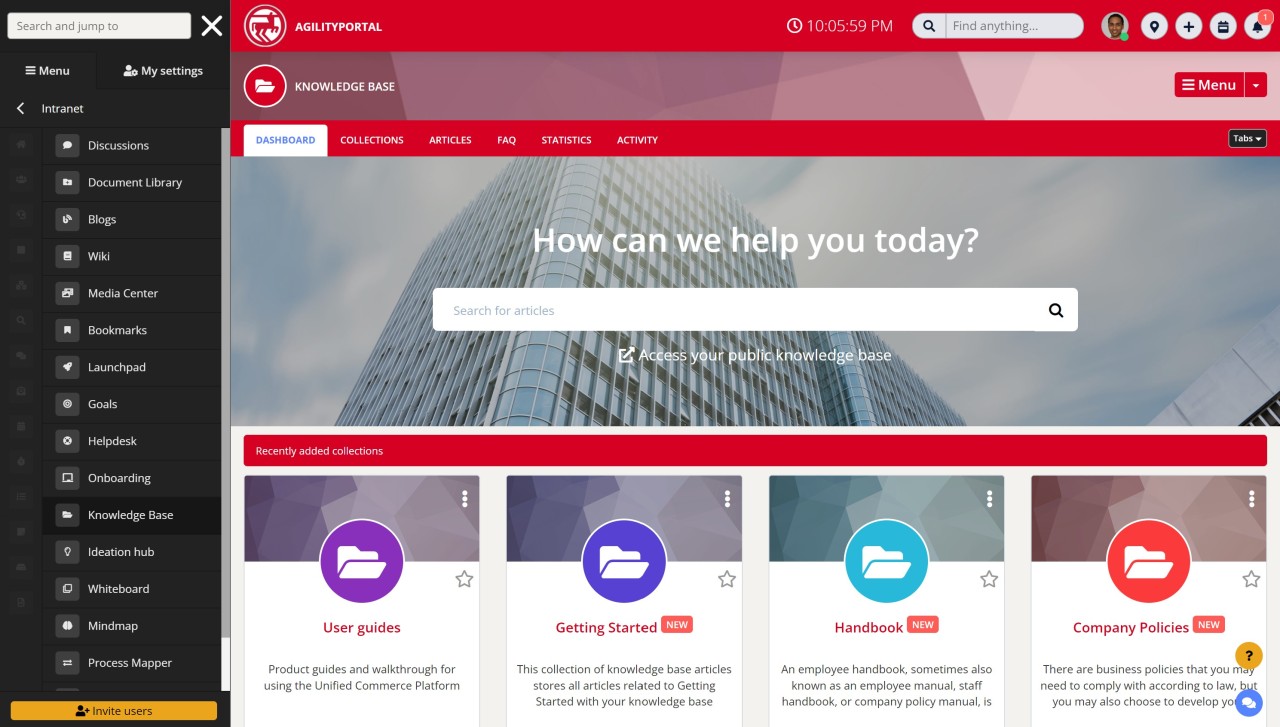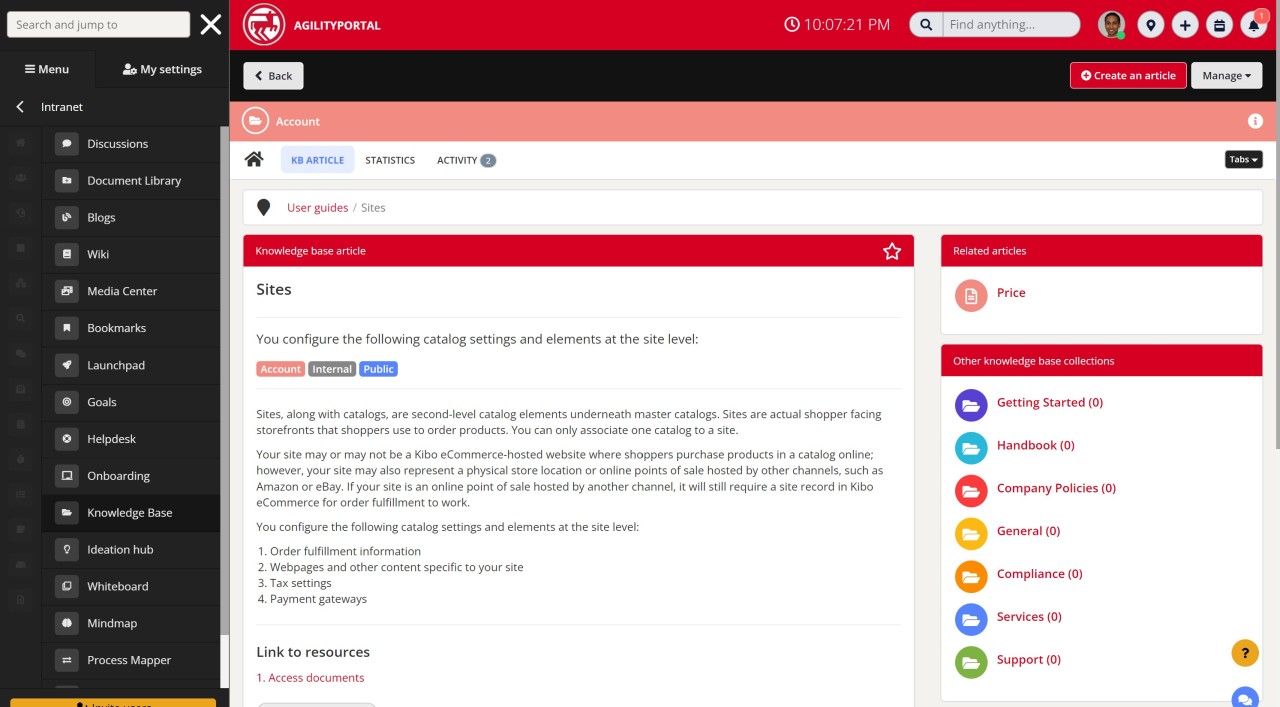Insight Blog
Agility’s perspectives on transforming the employee's experience throughout remote transformation using connected enterprise tools.
8 minutes reading time
(1619 words)
Top 10 Benefits of a Knowledge Base in 2022
As your customer base grows, so does the need to provide top-quality support at scale. What are the 10 Benefits of a Knowledge Base ?
A knowledge base can be a powerful tool for any business, large or small. By consolidating information in a central location, a knowledge base makes it easier for employees to find and get answers they need, when they need them.
This can save valuable time and improve customer satisfaction by ensuring that inquiries are addressed quickly and accurately. In addition, a knowledge base can help to reduce support costs by eliminating the need to field repeated questions. And because a knowledge base is always available online, it can provide 24/7 assistance to customers and employees alike.
Whether you're looking to improve customer service or increase efficiency, a knowledge base is worth considering.
Training, prompt responses to questions and open lines of communication amongst staff members are all essential as your organization expands. A knowledge base can be used to accomplish this goal.
A knowledge base facilitates effective teamwork and communication, and it aids customers in locating pertinent information at just the right time.
Now lets get to the top ten benefits of a knowledge base.
How do you define a knowledge base?
A knowledge base can be broadly defined as a collection of information that is organized and accessible for use.
This information can take many different forms, including text, images, and video. Knowledge bases are often used to store and share information within organizations, but they can also be used by individuals for personal knowledge management.
There are many different software platforms that can be used to create and maintain a knowledge base, and the best solution will vary depending on the needs of the users. When choosing a platform, it is important to consider factors such as ease of use, collaboration features, and integrations with other systems.
By carefully selecting the right platform, organizations can ensure that their knowledge base is an effective tool for storing and sharing information.
A knowledge base is a database that can be accessed from any computer and used to store and organize information for the benefit of both customers and staff.
It's a database of helpful knowledge that readers may peruse at their leisure to answer their own questions and avoid bothering the support team with routine matters.
Who can access knowledge bases?
Knowledge bases are a critical tool for businesses of all sizes. They provide a central repository for information and can be accessed by employees, customers, and partners. While many companies choose to keep their knowledge base private, there are also benefits to making it public. Public knowledge bases can be a valuable resource for customers and can help to build trust and confidence in your brand.
They can also be a good way to generate leads and build relationships with potential customers.
When deciding whether to make your knowledge base public or private, consider the needs of your business and the audience you want to reach. If you want to attract new customers and grow your business, a public knowledge base can be a powerful tool.
You can decide who can access the knowledge base. For example, customers can do their own research to find what they need. Knowledge bases can be either internal or external.
An internal database is for employees only. In contrast, an external knowledge base is designed solely for customers and support staff to access and use.
What are the benefits of knowledge sharing?
Knowledge bases are a critical tool for businesses of all sizes. They provide a central repository for information and can be accessed by employees, customers, and partners.
While many companies choose to keep their knowledge base private, there are also benefits to making it public.
Public knowledge bases can be a valuable resource for customers and can help to build trust and confidence in your brand. They can also be a good way to generate leads and build relationships with potential customers.
When deciding whether to make your knowledge base public or private, consider the needs of your business and the audience you want to reach. If you want to attract new customers and grow your business, a public knowledge base can be a powerful tool.
Your team can learn a lot from knowledge sharing and the information you have gathered. New team members can benefit much from a comprehensive knowledge base that is well-written, attractively laid up, and organized.
Self-service can be promoted to both customers and employees with a well-designed knowledge base. Thus, it can ease the burden on support staff. There are many other benefits of a knowledge base, including:
#1. Solve customer's problems quickly
Customers in the modern digital era expect answers to their problems immediately. Customers today have less patience than ever before for customer support channels such as online chat and email.
To help with this, you can use knowledge base software. When a customer has a problem and does a search for a solution, the knowledge base will return articles detailing the same problem.
It also shows its solution, thereby solving the issue in a matter of seconds.
Some of the benefits of using a knowledge base are that it can help with:
- Identifying the problem accurately in its earliest stages
- Minimize the length of time that customers spend on hold
- Provide the right solutions to your customers
#2. Boost trust and customer confidence
It's not easy to sow the seed of trust and see it flourish. It calls for constant value delivery throughout the client interaction process. A well-organized database of information can simplify your tasks.
You can use a knowledge base to improve:
- Access to useful data
- Reduce resolution time
- Customer Onboarding Issues
- Knowledge silos
#3. Avoid knowledge silos
Companies can benefit from having a single, authoritative source of information that can be accessed by all teams and departments thanks to a knowledge base. It can solve knowledge silos in an organization.
Since all members of the organization have access to the same data and are aware of how the other departments speak to their clients, the end result is a more streamlined and unified service delivery process.
#4.Boost repeat business
Improving customers' overall satisfaction is a constant struggle for customer care representatives.
Improved client retention is a natural byproduct of a knowledge base's ability to provide quick access to the most pertinent information at all times.
#5. Decrease the number of support tickets
Ticket submissions are avoided when information is simple to find and users can obtain what they need when they need it. Thus, users can solve their own problems with the help of a knowledge base.
#6.Preserve knowledge
You can facilitate the smooth handoff of responsibilities and information from one employee to another. A knowledge base encourages workers to meticulously document every project they finish, the piece of content they create, the question they answer, and the process they develop.
Furthermore, you should use a platform that supports the sharing of content in a variety of formats (pictures, audio, video, etc.).
An intranet like AgilityPortal makes it simple for specialists in a given field to disseminate and archive their knowledge in the method that is most practical for them.
#7.Make silos work
You can make silos work by aggregating expertise, assigning accountability, and providing a sense of identity. Many businesses produce abundant useful information, but it is crucial to identify this content at the correct time. It is also important for employees to share this knowledge. You can do this by following knowledge management practices and promoting a knowledge culture.
A knowledge base can save time and effort by serving as a central repository for all relevant resources that can be easily accessed and organized.
#8. Improve employee engagement
Transparency is a key to building trust, and if all of your company's knowledge is accessible through a knowledge base, that's exactly what your employees will see.
When workers know what other teams and departments are up to and how their own work fits into the bigger picture, they feel more invested in the organization as a whole and are more likely to go the extra mile to ensure its success.
#9.Enhance training process
On-demand training can be more effective and efficient if it is provided by an organization, and this is where a knowledge base comes in.
Some training sessions may still be led by a manager in person, but the rest of the contents can be stored in a central database and accessed by employees whenever they like.
When all of the knowledge base's contents are searchable, workers can quickly find the data that is most useful to them. Learners can take in new information and refresh their memories as they go about their daily tasks.
#10.Boost productivity
When workers from different offices need to share and access data, it might take a lot of time. When teams are dispersed across several time zones and speak different languages, this process becomes laborious.
The information that employees need is already stored in knowledge base articles. Moreover, knowledge management systems boost efficiency by eliminating the need for unnecessary conference calls.
Conclusion
When clients interact with your company, a knowledge base should be the first line of defense because it can offer immediate answers to their questions. In a similar vein, a knowledge base can improve the productivity of your internal staff by providing training resources and essential background data.
Categories
Blog
(2698)
Business Management
(331)
Employee Engagement
(213)
Digital Transformation
(182)
Growth
(122)
Intranets
(120)
Remote Work
(61)
Sales
(48)
Collaboration
(41)
Culture
(29)
Project management
(29)
Customer Experience
(26)
Knowledge Management
(21)
Leadership
(20)
Comparisons
(8)
News
(1)
Ready to learn more? 👍
One platform to optimize, manage and track all of your teams. Your new digital workplace is a click away. 🚀
Free for 14 days, no credit card required.
















